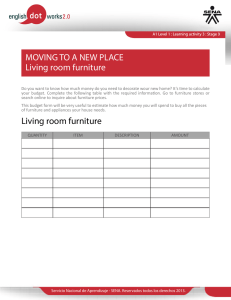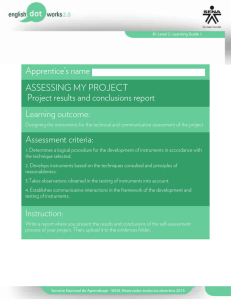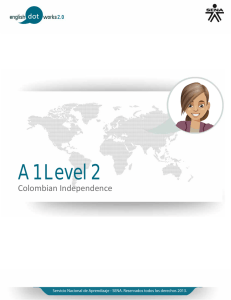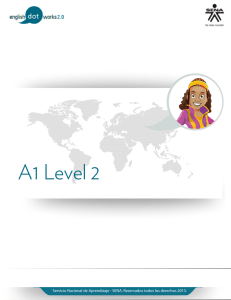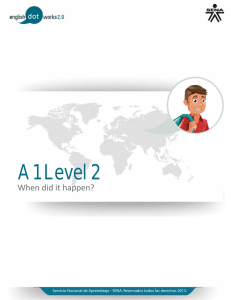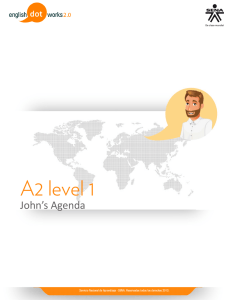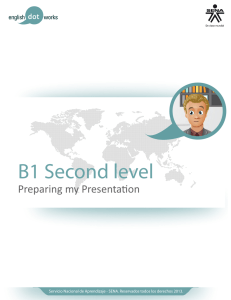A1 Level 2
Anuncio
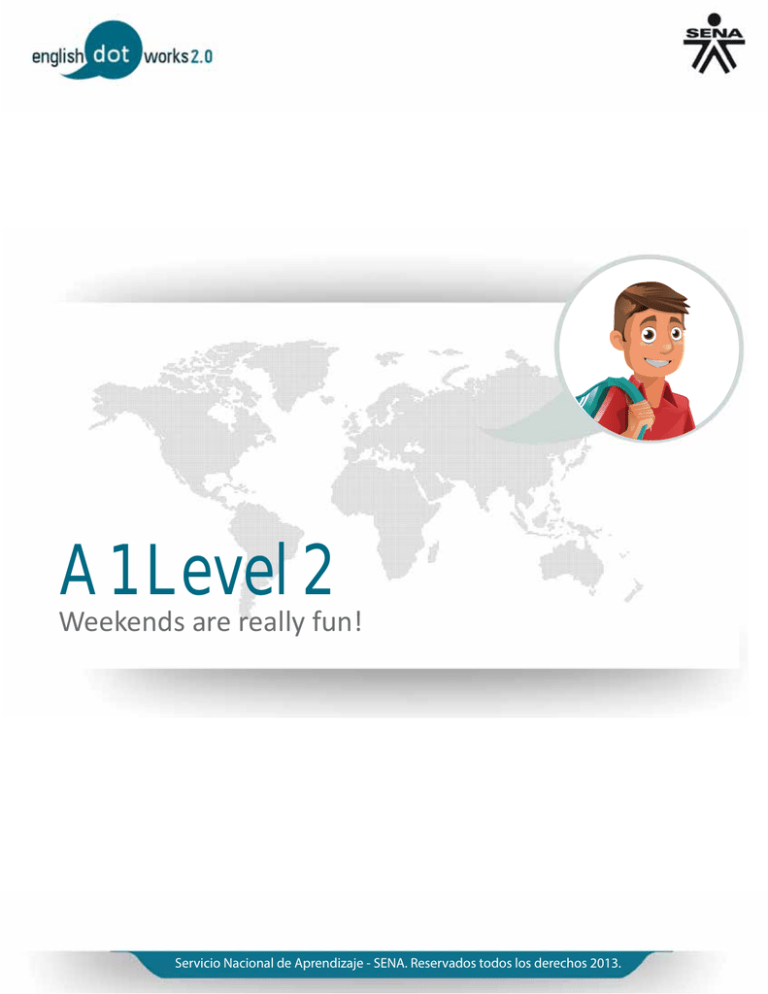
A1 Level 2 Weekends are really fun! Servicio Nacional de Aprendizaje - SENA. Reservados todos los derechos 2013. My name is Tim Robinson. It´s time to learn how to express past events, so let’s check how to make affirmative, negative and interrogative sentences based on different activities. Then, practice what you learn from these activities. Dear apprentices Here we go! Let’s start! Pay attention to the following dialogue: Warm-up GIRLS TIME! Tania: Hello? Linda: Hi, Tania! How are you? Tania: Fine, thanks… and you? Linda: Very good. I just talked to Claudia. She said she wants to go out sometime to catch up. Are you free tomorrow evening? Tania: Yeah! We can go to the mall and eat some ice cream. Linda: Yeah, that sounds great! Let’s go to the mall. Actually, I went to the ice cream shop last Saturday, and we had a great time, it was really fun. Servicio Nacional de Aprendizaje - SENA. Reservados todos los derechos 2013. 2 /9 Tania: Ok, great! So let´s meet by the door number 1 on Friday at 6:00 p.m. Linda: Yeah, Perfect! Tania: Ok, see you tomorrow! Linda: See you! Friday evening… Linda: Hi, girls! Claudia: Hello! How are you? Tania: I’m fine, thanks for asking. So, where do you want to go first? Tania: Let’s go to the food court and then do some window shopping. Linda: Great! I think I need to buy some new shoes anyway. Linda: What would you like to eat? I think I want a cheese burger. Claudia: I ate cheese burgers last night, I prefer fried chicken. Tania: So, do I Linda: I would eat some chicken too. Ok! So, three orders of fried chicken, French fries and diet cokes coming up! Tania: So, what did you do last weekend Claudia? Claudia: Well, on Saturday morning I cleaned my house. Then, in the afternoon I took a nap, but my cousin Sandra woke me up at five o’clock. She wanted me to go to the movies with her. There, we met some cute guys. But I wanted to go to the ice cream shop, so they went to the movies and we ate some sundaes. And on Sunday, I stayed home. I watched some movies, and I did my homework. What did you do last weekend? Servicio Nacional de Aprendizaje - SENA. Reservados todos los derechos 2013. 3 /9 Tania: Well, I was with my boyfriend. On Saturday, my boyfriend Charlie and I dined out. And later that evening we went to the arcade. On Sunday, we stayed home as well. But I didn’t do any homework. In the afternoon, we took out the karaoke and sang lots of old songs. Linda: Oh, that sounds like a lot of fun! Tania: Yeah, it really was! Let´s get inside Listen to Tania and Linda´s phone call. Then, drag and drop the numbers to the correct place to organize the conversation. GIRLS TIME! Tania: Ok, great! So let´s meet by the door number 1 on Friday at 6:00 p.m. Linda: Yeah, perfect! Tania: Hello? Linda: Hi, Tania! How are you? Tania: Ok, see you tomorrow! Linda: See you! Tania: Yeah! We can go to the mall and eat some ice cream. Linda: Yeah, that sounds great! Let’s go to the mall. Actually, I went to the ice cream shop last Saturday, and we had a great time, it was really fun. Tania: Fine, thanks… and you? Linda: Very good. I just talked to Claudia. She said she wants to go out sometime to catch up. Are you free tomorrow evening? Servicio Nacional de Aprendizaje - SENA. Reservados todos los derechos 2013. 4 /9 Let´s analyze Remember that when we want to talk about something that happens now or happens all the time, we use the actions in one way: I eat cheese burger. You are a student. He wakes me up at five o’clock. She wants me to go to the movies with her. It is fun to sing. We go to the arcade. They sing a lot of old songs. But if we want to talk about something that already happened and referring to past events we need to change these actions into past tense. For example: I eat cheese burger every week. You are a student. He wakes me up at five o’clock every day. She wants me to go to the movies with her. It is fun to sing. We go shopping every month. They usually sing a lot of old songs. I ate cheese burger last night. You were a student. He woke me up at five o’clock this morning. She wanted me to go to the movies yesterday. It was fun to sing last week. We went last weekend. They sang a lot of old songs last Sunday. Servicio Nacional de Aprendizaje - SENA. Reservados todos los derechos 2013. 5 /9 Let’s check what you just learned. Listen to the activities Tania and Claudia did last weekend! Then, select a verb and drag it into the correct gap. Click on the next link to get help with the vebs. ACTION ACTION IN THE PAST (Infinitive form) Am / is Eat Clean Do Dine Leave Meet Sing Stay Take Want Watch Go Wake (Past tense) Was Ate Cleaned Did Dined Left Met Sang Stayed Took Wanted Watched Went Woke We can also ask questions about things that already happened, pay attention to the order of words as it is the same you learned for present tenses before: Were you at the party? Was she your girlfriend in 2005? What did you do last weekend? Where did you go? Servicio Nacional de Aprendizaje - SENA. Reservados todos los derechos 2013. 6 /9 Notice that, when we ask about something that already happened, we use “were” and “was” instead of “am”, “is” or “are” and, “did” instead of “do” PRESENT TENSE Do Am / Is Are PAST TENSE Did Was Were Notice that you can add some expressions to the sentences to refer to things that happened already. For example: Yesterday Last year For two years Last weekend At 8:00 o’clock Before On Monday For three hours Let´s read some more examples: We went to the ice cream shop on Saturday. I ate cheese burgers last night. On Sunday, I stayed at home. On Saturday, morning I cleaned my house. What did you do last weekend? Servicio Nacional de Aprendizaje - SENA. Reservados todos los derechos 2013. 7 /9 Past Yesterday July 24th, 2013 Last week It was 1:30pm An hour ago A little while ago A long time ago In the past This morning Present Today July 25th, 2013 This week It is 2:30pm now At this moment These days nowadays At this time To transform statements into negative ones we use “wasn’t, “weren’t and “didn’t”. Mike was at the party Mike wasn’t (was not) at the party We were at the party We weren’t (were not) at the party Andrea danced at the party Andrea didn’t (did not) dance at the party Servicio Nacional de Aprendizaje - SENA. Reservados todos los derechos 2013. 8 /9 Credits Pedagogical Direction Paul Cifuentes Carlos Javier Amaya Direction of Art César Páez ICT Leadership Yeison Ospina Quality management Juan Carlos Rojas Script Composition Lina Váquiro Mónica Aldana Content Support Mónica María Arcos Hoyos Multimedia Development Graphic designers Diana Duque Jose Mario Alzate Programming engineers Felipe Becerra Voices David Molina Ciany Nelson San Andrés support team Servicio Nacional de Aprendizaje - SENA. Reservados todos los derechos 2013. 9 /9
